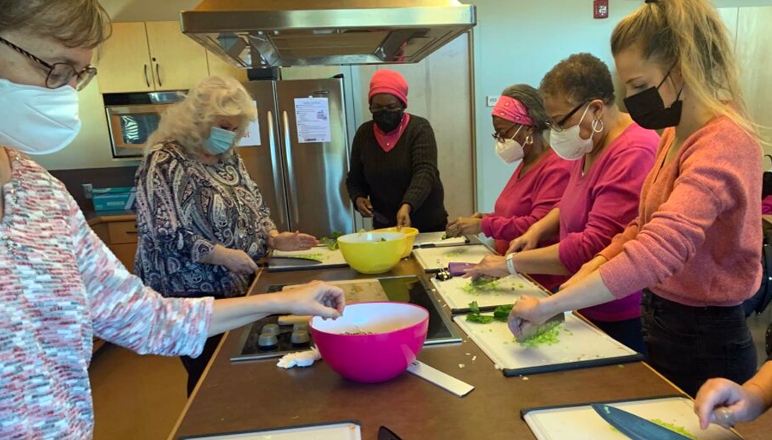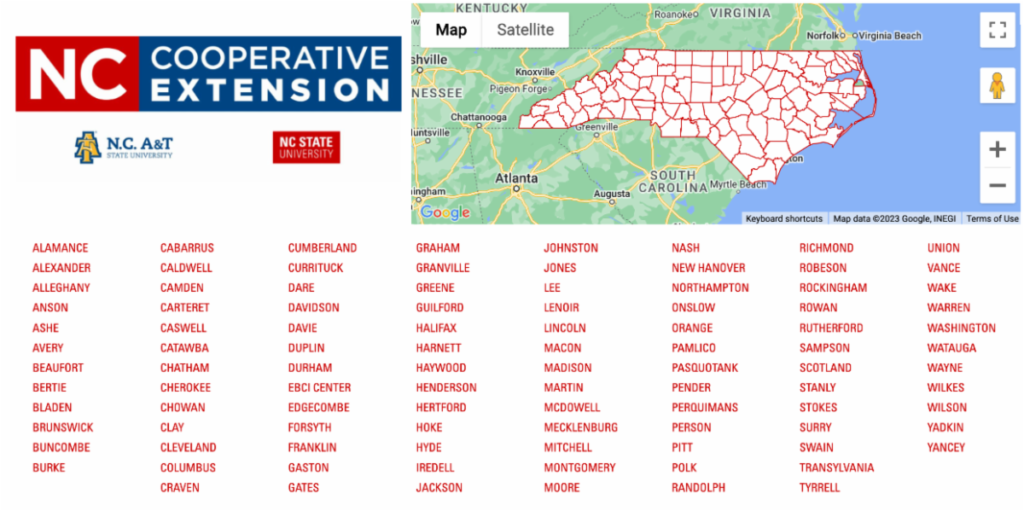Partner with NC Cooperative Extension to Support Community Health

Cooperative Extension is often called a “best kept secret,” except it’s not trying to hide, and would love to engage with more community members.
The Cooperative Extension Service was created over one hundred years ago by the National Institute of Food and Agriculture (part of the US Department of Agriculture) to support education and outreach programs aligned with American agriculture. The Cooperative Extension centers are based out of the land grant universities (such as NC State University and NC A&T State University) in all 50 states, the US Virgin Islands, and Puerto Rico. The centers employ experts in health and nutrition, as well as horticulture, livestock, forestry, and youth development. Programs such as Master Gardeners and 4-H are part of Extension. In North Carolina, there are 101 local Extension centers, one in each county and one serving the Eastern Band of Cherokee Indians.
The staff focused on health and nutrition–called Family and Consumer Science (FCS) agents in North Carolina–develop and administer programming focused on the health and nutrition needs of the population of their county. Much of their programming, such as events, workshops or courses, is free or low cost. They take into consideration the resources, funding and demographics of their local communities. Extension programming is based on the latest scientific evidence in the field and FCS programming “focuses on the importance of experiential, hands-on, and practical learning provided by a relatable […] person.” 1
The nationwide Expanded Food and Nutrition Education Program (EFNEP) also operates through the Extension offices. EFNEP is a federal program that focuses on nutrition education for low-income families. There is a focus not only on nutrition and well-being, but on self sufficiency. EFNEP “utilizes a paraprofessional (i.e., peer educator) model that draws upon shared life experiences and fosters credibility and trust between participant and EFNEP agent1.”
Find your local Cooperative Extension Center
Healthcare professionals and community members can use Cooperative Extension to meet patient and personal goals. Extension agents can help community members with nutrition education, learn how to grow and cook their own food, and find ways to eat food that has been grown locally. By including this resource in the recommendations for patients looking for a way to improve health, patients gain a wealth of specialized information available to every person living in the county.

In North Carolina, visit ces.ncsu.edu and click on “County Centers” in the top right corner. Click on your county to find the experts in your area. (Search here if you’re outside North Carolina)
This newsletter, FRESH Rx, is a publication of NC State Extension through the Plants for Human Health Institute’s PhytoMedicine program effort. My goal is to deliver research-based information to providers and the public that will improve human health through nutrition education. One of my primary initiatives right now is launching the PhytoRx program; an educational course for providers to empower them with knowledge to include nutritional guidance in a treatment plan for a specific diagnosis, and build a network of resources–including county FCS agents–that offer support to the patient in filling a fruit and vegetable prescription.
Citations
1. Cason, K. L., Chipman, H., Forstadt, L. A., Rasco, M. R., Sellers, D. M., Stephenson, L., & York, D. S. A. (2017). Family and consumer sciences focus on the human dimension: The expanded food and nutrition education program example. Journal of Family & Consumer Sciences, 109(3), 10-17.
This article was part of the April 2023 e-news FRESH Rx. Subscribe for similar content delivered to your inbox monthly.
- Categories: